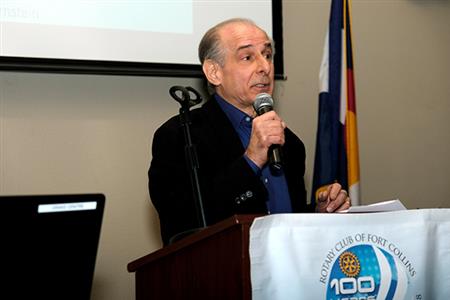 On February 5, Bruce Adolphe, a composer and educator based in New York and the artistic director of Off the Hook Arts, a local non-profit music festival and education program in Fort Collins, used personal experiences, anecdotes, and summaries of recent neuroscience research to highlight how participating in the arts is transformative and beneficial.
On February 5, Bruce Adolphe, a composer and educator based in New York and the artistic director of Off the Hook Arts, a local non-profit music festival and education program in Fort Collins, used personal experiences, anecdotes, and summaries of recent neuroscience research to highlight how participating in the arts is transformative and beneficial.Mr. Adolphe opened his presentation using both a native American story (Coyote Scatters the Stars) and reference to Albert Einstein’s thought processes involving music to point out that each of us is, in some way, both intellectual and intuitive, traditional and innovative, and that the arts help balance these two parts of our natures. He played a recording of his composition “Bending of Space-Time” from Einstein’s Light.
He then summarized some recent research showing that “seniors” benefited mentally (cognitive and mental performance) from exposure to music training and that children, with music training, benefited emotionally, and in development of motor skills and cognitive ability, as well as increasing the number of connections in the brain.
With an experiment involving closed eyes and imagining several different sounds, he introduced us to ideas about the musical imagination and creative process as distinct from the visual imagination. He pointed out that speaking is usually improvisational, just as in improvisational music, even though the latter uses no words.
With respect to the relation of music to the outside world, he made the point that instrumental music is often a construction or structure reflective of our experiences in the outside world. He contrasted music as background (“elevator music”) with music as a central focus; music from compressed files (e.g, MP3s) vs. music from live performances – comparing your favorite meal to that meal blenderized and frozen that you only get to lick.
In response to a question, Mr. Adolphe pointed out that, even though a piece of music is written from a certain personal framework, it can be perceived from all sorts of different frameworks, but all may have the same overarching emotional story arc, so that the personal becomes universal. Any “art” may be perceived from a wide spectrum of valid viewpoints.
For another question reference getting children interested in music, he suggested that telling a child that he will hear a really great piece of music is likely to put him off, whereas simply exposing him to music, either by listening or especially by studying an instrument, is likely to draw the child into appreciation of music.
To hear Bruce Adolphe’s Einstein’s Light, recorded by Joshua Bell and Marija Stroke, visit:
https://open.spotify.com/album/0KbPc1LvKri0SILxKW3wDT